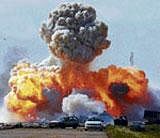

At least 112 Tomahawk missiles were fired from American and British ships and submarines in Operation Odyssey Dawn (OOD), targeting some 20 Libyan air and missile defence targets in Tripoli and western city of Misurata, US Navy Vice Admiral William Gortney said at a Pentagon briefing in Washington.
India and Russia came out against the strikes. India said it regrets the air strikes that are taking place and wanted measures to be taken to mitigate and not exacerbate the already difficult situation for the Libyan people. Moscow pushed for an end to “indiscriminate use of force” by the US-led forces and said the intervention in Libya has been “adopted (by the UNSC) in haste”.
In a late evening development, the Libyan armed forces have issued a command to all units to observe an immediate ceasefire, a Libyan army spokesman told a news conference. “The Libyan armed forces have issued a command to all military units to safeguard an immediate ceasefire from 9 pm (1900 GMT),” a Libyan army spokesman said.
French jets fired the first shots in OOD, the biggest international military intervention in the Arab world since the 2003 invasion of Iraq, destroying tanks and armoured vehicles in eastern Libya, Al-Jazeera reported.
Libyan state television said 48 civilians have been killed and 150 wounded as a result of this “aggression”. It claimed most of the casualties were children but gave no details. But “Reuters” claimed that 64 civilians have died in the missile attacks over Libya.
The BBC quoted UK Finance Minister George Osborne as saying that such claims should be treated with caution as the military was striving to avoid civilian casualties. Heavy firing and explosion were heard in several parts of the Libyan capital.
Al-Jazeera quoted an unnamed US military officials as saying that “Gadhafi’s air defence systems have been severely disabled. It’s too soon to predict what he and his ground forces may do in response to today’s strikes”.
Despite the reverses, a defiant Gadhafi slammed the West for the “aggression”, saying “We will not leave our land and liberate it.” Warning that it will be a “long war”, he said: “We will fight for every square in our land”.
“We will die as martyrs,” he said in his roughly 15-minute address, the second since the air raids began on Saturday after the UN Security Council gave its nod for ‘no fly’ zone over Libya to halt Gadhafi’s air powers against rebels.
The Council move had come after international outrage over Gadhafi's forces pounding rebel-held positions including Benghazi, Misurata, Tobruk and Ajdabiya.
Claiming that the Libyan “people are behind him and ready for all-out war”, Gadhafi threatened to throw open defence supplies to arm civilians to defend the country.
“It is now necessary to open the stores and arm all the masses with all types of weapons to defend the independence, unity and honour of Libya,” 68-year-old Gadhafi said in his audio message broadcast.
He drew parallel to other US-led wars, including Vietnam, saying the air attacks by French, US and British forces amounted to a “war on Islam”, Al Jazeera said.
US President Barack Obama said it had not been his first choice to authorise US participation in military strikes against the Gadhafi regime.
“Today I authorised the Armed Forces of the United States to begin a limited military action in Libya in support of an international effort to protect Libyan civilians. That action has now begun,” Obama said from Brazil, where he has just begun a five-day visit through Latin America.
“This is not an outcome the US or any of our partners sought,” Obama said.
US military forces are on the leading edge of the coalition operation, taking out Libya’s integrated air and missile defence system.
“The ordnance is aimed at radars and anti-aircraft sites around the capital of Tripoli and other facilities along the Mediterranean coast,” the Pentagon said in a statement.
Admiral Mike Mullen, Chairman of the US Joint Chiefs of Staff, said the Gadhafi regime still has some “surface to air capabilities”, but the strikes so far have been very successful.
“He (Gadhafi) still has some surface-to-air capability, where he could attack an aircraft, including one of ours,” Mullen was quoted as saying by the ABC news today.
“We haven’t seen large-scale indications of that after the action yesterday. He clearly has the ability to continue to attack his own people, and then we’re very focused on that, and trying to ensure that his military forces don’t do that,” he said.
Benghazi, he said, however, is still not safe at this particular point in time.
France, Britain and the US had warned Gadhafi on Friday that they would resort to military means if he ignored the UN resolution.